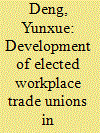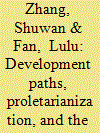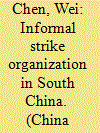|
|
|
Sort Order |
|
|
|
Items / Page
|
|
|
|
|
|
|
| Srl | Item |
| 1 |
ID:
170981


|
|
|
|
|
| Summary/Abstract |
In an investigation of the development of elected workplace trade unions in the Guangzhou auto parts industry from 2011 to 2015, this article explores autoworkers' capacity to build associational power in authoritarian China. It finds that an unprecedented wave of strikes in 2010 pushed the regional trade union in Guangzhou into promoting workplace trade union reform, which opened a limited but important opportunity for autoworkers to participate in trade union affairs. Since then, autoworkers have learned to utilize the elected workplace trade unions' resources to forge collective demands and actions. The author argues that autoworkers in Guangzhou are building their associational power by penetrating and exercising partial control over the state-run trade union at the grassroots level. Compared to independent trade unionism in other newly industrialized countries, these autoworkers' unionization efforts are small scale, are less militant, and can be easily suppressed by a powerful local state and global capital. Despite this, they demonstrate the growing trade union consciousness and unionization efforts among autoworkers in South China
|
|
|
|
|
|
|
|
|
|
|
|
|
|
|
|
| 2 |
ID:
170979


|
|
|
|
|
| Summary/Abstract |
From the perspective of development, this article examines the power relations among local states, capital, and migrant laborers that shape the making of proletarians/semi-proletarians in two famous garment manufacturing areas, Humen in the Pearl River Delta and Pinghu in the Yangtze River Delta. It emphasizes the distinct forms of association in the daily production process of workers against the exploitation by capital and the control of states embedded in two different power relations. In Humen, a high proportion of external investment in the garment industry and lack of local authority regulatory resources, accompanied by highly mobile migrant workers without local hukous, undermines the foundation of daily association in production. Migrant workers generally work with subcontractors and "vote with their feet." In Pinghu, the historical heritage of collective economies enhances the control of local authorities over both labor and capital, which has led to the full proletarianization of garment industry workers. Meanwhile, embedding deeply in local communities empowers local workers to associate in cooperative production teams and negotiate with capitalists collectively, resulting in a relatively higher payback. Both forms of imperceptible daily struggles generate transformation of labor institutions in the two areas.
|
|
|
|
|
|
|
|
|
|
|
|
|
|
|
|
| 3 |
ID:
170980


|
|
|
|
|
| Summary/Abstract |
The article investigates whether and how economic upgrading leads to social upgrading for rural migrant workers (RMWs) in the Pearl River Delta (PRD) region of China. Two cities that represent different types of economic upgrading in the PRD, namely Shenzhen and Foshan, were selected as the investigation sites. The data were mainly obtained from statistical yearbooks and interviews with 72 informants, including RMWs, scholars, employers, and officials. The article argues that two types of economic upgrading, namely reindustrialization and tertiarization, affect the social upgrading of RMWs in different ways. However, both types of economic upgrading have caused a pushing-out effect by increasing unemployment or working intensity and living costs.
|
|
|
|
|
|
|
|
|
|
|
|
|
|
|
|
| 4 |
ID:
170982


|
|
|
|
|
| Summary/Abstract |
In contrast to the workers who organize strikes in the West, Chinese workers lack support from official unions and have to rely on informal ways to strike. The previous literature suggests that worker-leaders have played a role in initiating wildcat strikes, and the engagement of labor NGOs has also facilitated grassroots activism. The focus of previous studies has been on the emergence, approaches, and strategies of the actors involved in different labor protests. However, we still know little about the direct or unintended consequences of the numerous strikes in South China. Based on fieldwork in the Pearl River Delta, this article explores how the informal strike organization built by workers, namely the "worker representative mechanism," contributes to favorable outcomes for labor. By conducting a comparative case study, this article identifies two important factors that have impacted strike outcomes: how this mechanism builds up a wider representation when the union is absent and how it sustains its core leadership for successive strikes and accomplishment of strike goals. By examining how workers build the representative mechanism that, in practice, acts as an informal strike organization, this article illustrates an alternative pattern of organization in strikes that bypasses trade unions and discusses its influences on emerging Chinese labor activism.
|
|
|
|
|
|
|
|
|
|
|
|
|
|
|
|
| 5 |
ID:
170985


|
|
|
|
|
| Summary/Abstract |
Pneumoconiosis is one of the most signicant occupational diseases in China. We argue the key driver behind pneumoconiosis prevalence and consequent limited treatment is a balance of power signicantly favoring capital over labor. The political and economic history of China has included a systematic weakening of the position of labor through unfettered marketization and weak trade unions. This is especially true for the mining secto, where pneumoconiosis is an occupational risk. The changed structure of the mining industry, the lowering standards of labor protection, the decentralization of taxation and associated inequalities between provinces, and the generation of surplus labor associated with the household responsibility system have all played their part in the pneumoconiosis outbreak. Several policy issues have exacerbated the sufferings of pneumoconiosis-stricken workers that we explore in this article. On a grassroots political level, the absence of effective unions in China, including in the mining industry, provides a compelling explanation for why these policy issues
|
|
|
|
|
|
|
|
|
|
|
|
|
|
|
|
| 6 |
ID:
170984


|
|
|
|
|
| Summary/Abstract |
How did workers and students defend trade union rights at Jasic Technology based in Shenzhen beginning from summer 2018? When worker leaders faced managerial retaliation and police brutality, a group of young Maoists and Marxists composed primarily of Chinese university students and recent graduates, formed the Jasic Workers Support Group. As it evolved, the widening crackdown on lewing student associations, labor rights groups, and social service organizations exemplified deepening state repression through 2019. The worker-student alliance as illustrated by the case of Jasic, while precarious and short-lived, reignited a century-long Chinese revolutionary legacy. It also offers a rare glimpse of a contemporary transnational labor and student network.
|
|
|
|
|
|
|
|
|
|
|
|
|
|
|
|
| 7 |
ID:
170983


|
|
|
|
|
| Summary/Abstract |
This article examines the relations between official trade unions and labor NGOs in South China. Previous studies on Chinese labor NGOs have focused on their roles in empowering workers (optimistic vs. pessimistic views) and the strategies of the party-state to deal with them (exclusion and incorporation), but one important point has been missing from the literature: the pressure labor NGOs place on the All-China Federation of Trade Unions (ACFTU) to reform itself. Based on two case studies of local trade union innovation projects in South China, this article demonstrates how the local branches of the ACFTU have innovated in their ways of servicing and organizing migrant workers, including taking initiatives similar to those of labor NGOs. These innovation projects have attempted to reclaim the “territories” of trade unions, which have been deeply contested by labor activism in the past two decades.
|
|
|
|
|
|
|
|
|
|
|
|
|
|
|
|
| 8 |
ID:
170978


|
|
|
|
|
| Summary/Abstract |
Since China's economic reform began in 1978, millions of migrant workers have moved from inland provinces to coastal cities in search of work. This had led to an abundance of cheap labor and a prevalence of despotic management styles in the private sector since the 1980s. This scenario changed significantly from the 2000s with the proliferation of workers' strikes and the efforts of the party-state to regulate workplace relations. Against this backdrop, scholars have debated about the extent to which labor relations in China have changed, and where they may be heading. As a contribution to this debate, this special issue brings together six articles with strong empirical evidence to unpack the complexity and dynamics of workers' struggles and organizations in South China in the context of a changing political economy. Going beyond the polarization of an optimistic vision on labor movements, and a pessimistic view that emphasizes state power, we pay equal attention to the power of state institutions and workers' agency in shaping labor relations during the past four decades.
|
|
|
|
|
|
|
|
|
|
|
|
|
|
|
|
|
|
|
|
|